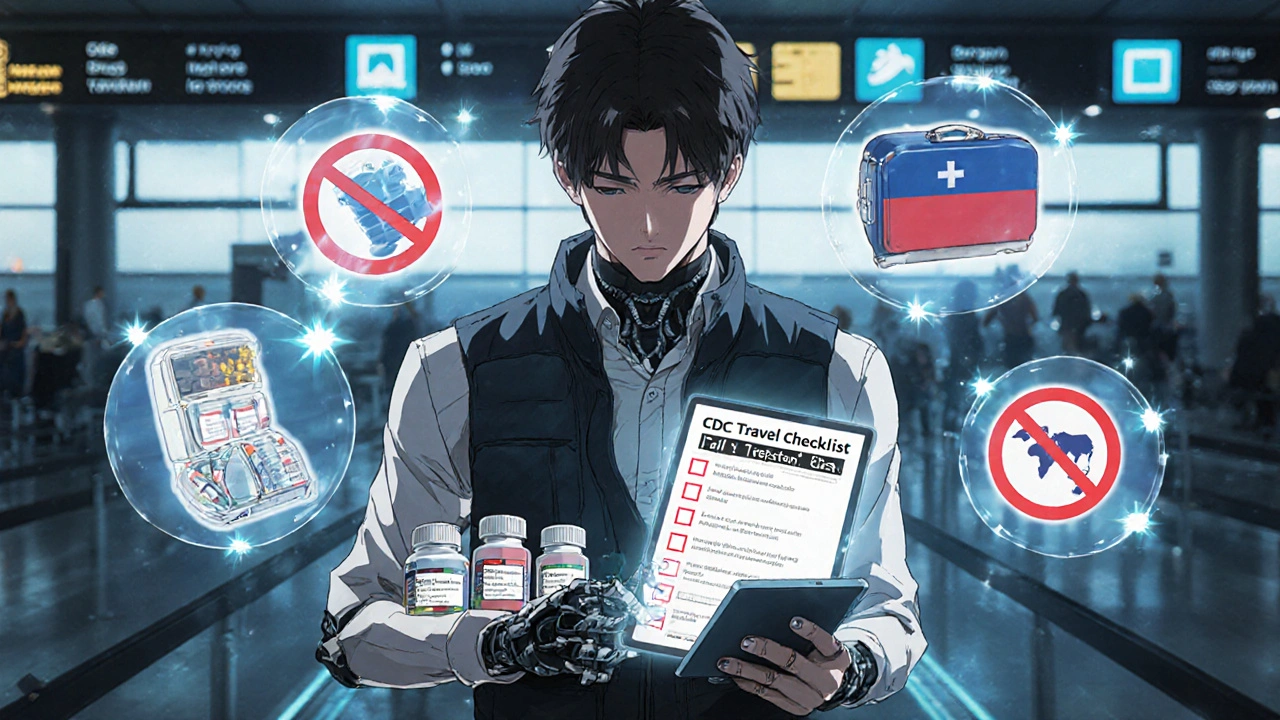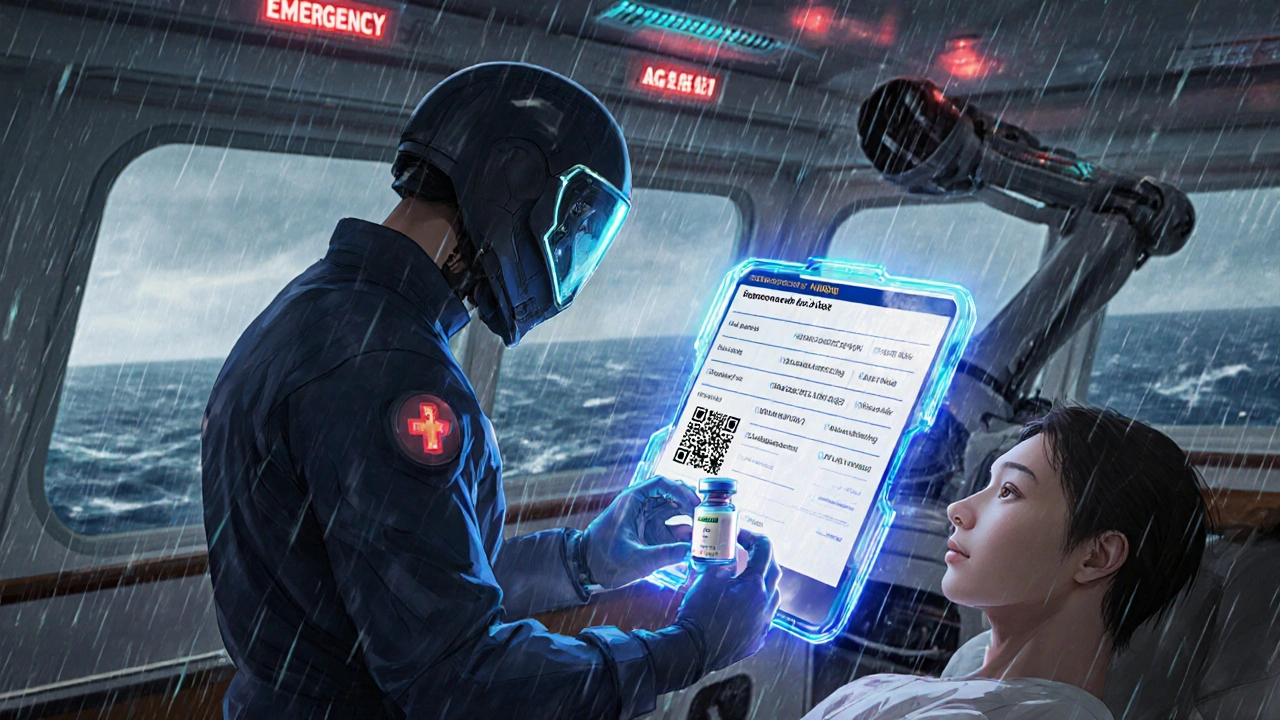 Nov, 24 2025
Nov, 24 2025
Running out of medication halfway through a road trip or stuck on a cruise ship with no access to your pills is a nightmare no one plans for. But it happens more often than you think-especially when people transfer pills into random containers, forget extra supplies, or don’t check if their meds are even allowed in the next port. The good news? With the right prep, you can avoid all of it. Here’s how to pack your medications safely and legally for long road trips and cruises in 2025.
Start 30 Days Before You Leave
Don’t wait until the night before to sort out your meds. Begin planning at least a month ahead. First, sit down with your doctor. Bring your full list of prescriptions, including over-the-counter stuff like pain relievers or antacids if you take them daily. Ask: "Are any of these restricted in the countries or states I’ll visit?" That’s not just a formality-it’s critical. For example, some Caribbean islands ban common ADHD medications like Adderall. Others require special permits for painkillers containing codeine. According to the International Association for Medical Assistance to Travellers (IAMAT), 22% of commonly used medications face restrictions in at least one cruise destination. Your doctor can help you get replacement prescriptions, adjust dosages, or provide a signed letter explaining why you need each drug. This letter should include your name, the generic and brand names of each medication, dosage, and frequency.Keep Everything in Original Containers
This isn’t optional. Whether you’re flying, driving across state lines, or stepping off a cruise ship, your meds must be in their original pharmacy-labeled bottles. No exceptions. TSA, U.S. Customs, and cruise lines like Royal Caribbean and Norwegian all require this. The label must show your full name (matching your passport), the drug name, dosage, and the pharmacy’s info. Why? Because if you’re caught with unlabeled pills-even if they’re yours-you could face delays, confiscation, or even legal trouble. One Reddit user, u/TravelMedNurse, shared that 90% of the medication issues they’ve seen on cruises came from people dumping pills into pill organizers without labels. And in 37% of those cases, passengers were denied entry at ports. If you use a daily pill organizer, keep the original bottles in your carry-on and only transfer pills into the organizer for convenience. Always label the organizer clearly with your name, the medication name, and times (e.g., "Morning: Lisinopril 10mg"). Tape the lid shut so it doesn’t open mid-trip.Bring Extra-A Lot Extra
Delays happen. Flights get canceled. Ships dock late. Road closures happen. You need more than just enough for the trip. For road trips: Bring at least one extra day’s supply. For cruises or flights: Bring two extra days. But here’s the smarter move-bring a full week’s extra. Why? OAG Aviation reports that 23% of international flights experience delays of more than 3 hours. Cruise itineraries change often due to weather or port issues. And if you’re on a multi-week trip, you don’t want to be scrambling. If you take insulin, thyroid meds, or anything that can’t be easily replaced, pack even more. The FDA says 41% of biologic medications (like insulin or rheumatoid arthritis drugs) require temperature control. A UV-protective travel case that holds its cool for 72 hours is a smart investment.
Organize Like a Pro
Packing meds isn’t just about containers-it’s about access. Keep everything you need daily in your carry-on. Never check your meds. The FAA and TSA both say essential medications must be with you. SITA’s 2022 Baggage Report shows 0.02% of bags are lost annually-but that’s still 1 in 5,000. You don’t want to be that person. Use a clear, quart-sized Ziploc bag for your meds. It makes security checks faster and keeps things dry. Inside that bag, put:- Original prescription bottles
- One labeled pill organizer (if you use one)
- A printed copy of your doctor’s letter
- A digital copy saved on your phone (screenshot or cloud doc)
Know the Rules for Cruises vs. Road Trips
Cruise lines have stricter rules than road trips. Royal Caribbean requires all medications to be declared in advance and kept in original containers. Norwegian Cruise Line asks you to report controlled substances 30 days before sailing. Carnival requires doctor documentation for any meds with codeine or other Schedule II drugs. Road trips? The challenge isn’t the rules-it’s the patchwork. The American Automobile Association found that 67% of drivers ran into medication issues crossing state lines. Why? Medical marijuana is legal in 38 states but still illegal in 13. Even if your state allows it, crossing into one that doesn’t can mean confiscation. Same goes for certain ADHD or sleep meds-some states classify them differently. Bottom line: If you’re driving, know the laws of every state you’ll pass through. If you’re cruising, check the rules of every country your ship docks in. The CDC’s 2024 Travelers’ Health Update includes a digital checklist with QR codes linking to country-specific rules. Use it.Prepare for Emergencies
Medication isn’t the only thing you need to plan for. What if you get sick? What if you lose your meds? Travel insurance that covers medical evacuation is non-negotiable. The Cruise Lines International Association reports that 28% of cruise medical emergencies require evacuation-and the average cost is $48,000. Also, carry a printed and digital list of your meds. Include:- Brand name
- Generic name
- Dosage
- Frequency
- Reason for use

Use New Tools-They’re Here
The travel health industry has evolved. CVS and Walgreens now offer free repackaging services for travelers. You can drop off your prescriptions and walk out with travel-sized bottles labeled for your trip. Some pharmacies even include a small booklet with your meds and instructions. IATA’s Travel Pass app (required for international flights since April 2024) lets you upload digital prescriptions. Royal Caribbean now asks passengers to submit their medication list electronically 72 hours before sailing. This cuts boarding delays by nearly 30%. And if you’re worried about theft or tampering? Carnival is testing fingerprint-based medication verification systems on select ships. It’s still new, but it shows where the industry is headed.Final Checklist
Before you lock your suitcase, run through this:- ✅ All meds in original, labeled bottles
- ✅ Doctor’s letter with generic names and dosages
- ✅ Digital and printed copies of your medication list
- ✅ Two extra days’ supply (one week if you’re on critical meds)
- ✅ Meds in a clear Ziploc bag in your carry-on
- ✅ Checked destination country restrictions (CDC or Smartraveller site)
- ✅ Travel insurance that covers medical evacuation
- ✅ Temperature-sensitive meds in a cooling case (if needed)
Frequently Asked Questions
Can I put my medications in a pill organizer instead of the original bottle?
You can use a pill organizer for convenience, but you must keep the original labeled bottles with you at all times. Security checkpoints and customs officers require the original pharmacy label to verify your meds. Never travel with only unlabeled pills-even if they’re yours.
Do I need to declare my medications at customs?
You’re not always required to declare them, but you must be ready to show them if asked. Keep your original bottles and doctor’s letter handy. Some countries, especially in the Caribbean and Asia, have strict rules on certain drugs. If you’re unsure, declare them anyway-it’s better than risking confiscation or fines.
What if I need to refill a prescription while traveling?
It’s possible, but not guaranteed. Pharmacies abroad may not recognize your U.S. prescription. Always carry your doctor’s letter and a list of generic names. For long trips, ask your doctor for a 30- to 90-day supply upfront. If you’re on a cruise, the ship’s medical center can sometimes help, but they charge fees and may not have your exact medication.
Are over-the-counter meds like ibuprofen or antihistamines a problem?
Most are fine, but some OTC drugs contain ingredients banned in other countries. For example, pseudoephedrine (found in some cold meds) is restricted in several places because it can be used to make illegal drugs. Check the CDC’s Travelers’ Health site for country-specific restrictions-even for simple pain relievers.
Should I bring my medications in checked luggage if I’m on a long road trip?
Never. Even on road trips, keep your meds with you. Accidents happen. Your car could be broken into, or you might need to stop suddenly for an emergency. Always keep your prescriptions, insulin, heart meds, or anything life-sustaining in your personal bag or pocket. Don’t risk it.
Srikanth BH
November 25, 2025 AT 00:08Just did a 10-day cruise last month and this guide saved my life. I brought extra weeks of my blood pressure meds in the original bottles, labeled my organizer, and kept everything in a clear Ziploc with the doctor’s letter. No issues at any port. Seriously, do this stuff. It’s not extra work-it’s insurance.
Josh Gonzales
November 26, 2025 AT 08:34Don’t forget about humidity. I lost half my insulin vials on a Caribbean trip because I packed them in my checked bag. The cargo hold got hot and damp. Now I keep mine in a thermal case with a cold pack right in my backpack next to my passport. TSA didn’t even blink. Just tell them it’s life-saving. They get it.
Valérie Siébert
November 27, 2025 AT 15:26OMG YES I’M SO GLAD SOMEONE SAID THIS I WAS JUST ON A CRUISE AND MY PILL ORGANIZER OPENED IN MY BACKPACK AND I HAD TO REASSEMBLE EVERYTHING ON THE DECK AT 3AM LIKE A MEDICAL NINJA. LABEL IT. TAPE IT. TREAT IT LIKE YOUR PHONE PASSWORD. ALSO THE COLD CASE IS A GAME CHANGER. I GOT ONE FROM CVS AND IT LASTED 72 HOURS EVEN IN THE TROPICS. THANK YOU.
Jack Riley
November 29, 2025 AT 12:04Let’s be real-the whole ‘original containers only’ rule is a bureaucratic farce. If you’re a law-abiding citizen with a prescription, why should you be forced to carry bulky bottles like you’re smuggling contraband? The real threat isn’t unlabeled pills-it’s the systemic distrust of patients. The industry wants control, not safety. I’ve carried my meds in a velvet pouch for years. Never been questioned. But hey, if you wanna play by the rules, fine. Just know you’re feeding the machine.
Jacqueline Aslet
November 29, 2025 AT 12:44One must consider the ontological implications of pharmaceutical sovereignty in transnational mobility. The original container, as a symbol of institutional legitimacy, enforces a heteronormative epistemology of medical authority, wherein the patient’s embodied knowledge is subordinated to the pharmacopeia’s bureaucratic signifiers. One might argue that the Ziploc bag, as a postmodern artifact of containment, paradoxically liberates the subject from the tyranny of the pharmacy label-yet, paradoxically, it remains tethered to the very regime it seeks to evade. The doctor’s letter, then, becomes a performative utterance of compliance, a ritual sacrifice to the altar of regulatory compliance. One wonders: are we safeguarding health-or merely appeasing the specter of liability?
Caroline Marchetta
November 30, 2025 AT 05:05Oh great. Another ‘pro tip’ from someone who clearly has never been denied entry at a Caribbean port because they forgot to bring their *original* bottle of Adderall. You know what’s worse than running out of meds? Being interrogated by a customs officer who thinks you’re a drug mule because you used a pill organizer. I cried in an airport bathroom for 45 minutes. And now I’m supposed to be grateful for a ‘practical guide’? Thanks, I guess. At least I didn’t get deported.
Patricia McElhinney
November 30, 2025 AT 12:53This guide is dangerously incomplete. You didn’t mention that some countries classify melatonin as a controlled substance. I was fined €300 in Germany because I thought it was ‘just a supplement.’ Also, you said ‘two extra days’-that’s reckless. For insulin users, you need at least 10 days extra. And why no warning about airport X-ray machines degrading biologics? I’ve seen studies-30% of insulin loses potency after 3 passes. You’re not just being irresponsible-you’re putting lives at risk.
Shivam Goel
December 2, 2025 AT 03:58Statistically, 23% of international flights are delayed >3hrs, per OAG-true. But you didn’t factor in the 17% of cruise itineraries that change due to weather, per CLIA 2024 data. Also, 41% of biologics require temperature control-correct-but you failed to reference the FDA’s 2023 guidance on thermal stability thresholds (±2°C for insulin, ±5°C for RA biologics). And your ‘color-coded Ziplocs’ suggestion? That’s anecdotal. Where’s the peer-reviewed study? Where’s the sample size? This is not evidence-based. It’s crowd-sourced folklore dressed as authority.
katia dagenais
December 2, 2025 AT 04:08You think you’re being smart by bringing extra meds? Let me tell you what happened to me on my last trip-I packed so much I forgot which bottle was which. Took the wrong thyroid pill for three days. Ended up in a hospital in Mexico with a panic attack and a $4,000 bill. So yeah, organize. Label. But don’t overpack. Because sometimes, the thing that saves you isn’t the extra pills-it’s the humility to admit you might need help. And maybe, just maybe, you should’ve called your doctor before you left.